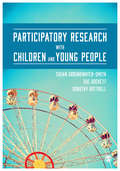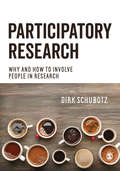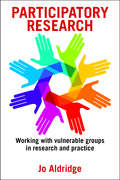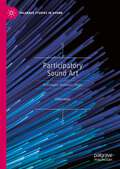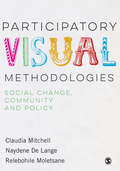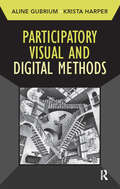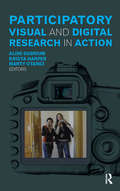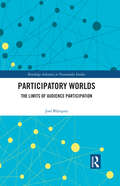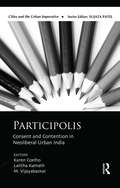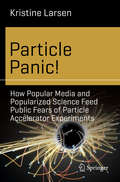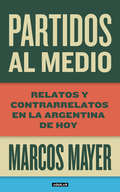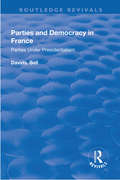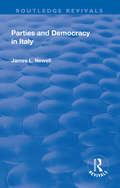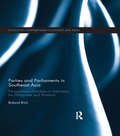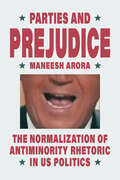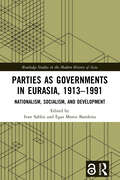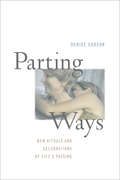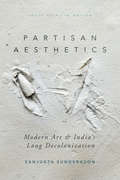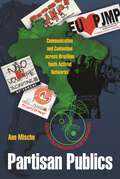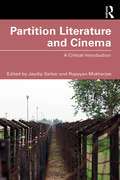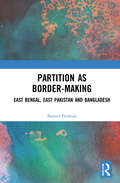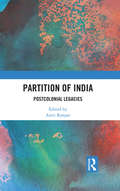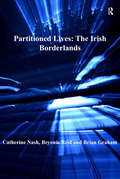- Table View
- List View
Participatory Research with Children and Young People
by Susan Groundwater-Smith Sue Dockett Dorothy BottrellThis book sets out a clear framework for conducting participatory research with children and young people within a discussion of the rights of the child. Through extensive case studies and a close review of contemporary literature, in relation to early childhood through to late adolescence, the book serves as a critical guide to issues in participative research for students and researchers. The book includes chapters on: Designing your research project Ethical considerations Innovative methods Publication and dissemination.
Participatory Research: Why and How to Involve People in Research
by Dirk SchubotzGoing beyond a general introduction to offer a hands-on guide, Participatory Research empowers students to feel confident understanding and applying participatory methods to their research projects. It takes an accessible approach to explaining the theory that grounds participatory research and offers students practical strategies for how and when to choose and apply a wide range of these methods. Comprehensive yet easy to understand, this book: · Gives students a thorough grounding in the history and theoretical issues surrounding each method · Showcases participatory research in action through extensive on-the-ground case studies · Highlights the importance of ethics in research design, offering guidance on dealing with sensitive considerations in participatory research With a sustained focus on the impact of digital technologies, this book tackles head-on the need to re-assess the way we involve people in contemporary research. It is an essential guide to better research practice for students and researchers across the social sciences.
Participatory Research: Why and How to Involve People in Research
by Dirk SchubotzGoing beyond a general introduction to offer a hands-on guide, Participatory Research empowers students to feel confident understanding and applying participatory methods to their research projects. It takes an accessible approach to explaining the theory that grounds participatory research and offers students practical strategies for how and when to choose and apply a wide range of these methods. Comprehensive yet easy to understand, this book: · Gives students a thorough grounding in the history and theoretical issues surrounding each method · Showcases participatory research in action through extensive on-the-ground case studies · Highlights the importance of ethics in research design, offering guidance on dealing with sensitive considerations in participatory research With a sustained focus on the impact of digital technologies, this book tackles head-on the need to re-assess the way we involve people in contemporary research. It is an essential guide to better research practice for students and researchers across the social sciences.
Participatory Research: Working with Vulnerable Groups in Research and Practice
by Jo AldridgeThis book examines the nature of participatory research in the social sciences and its role in increasing participation among vulnerable or marginalised populations. Drawing on engaging in-depth case studies, it examines the ways in which inclusion and collaboration in research can be enhanced among vulnerable participants, such as those with profound learning difficulties, victims of abuse and trauma and multiply vulnerable children and young people, and shows how useful it can be with these groups. The book will be an invaluable resource for students, researchers and academics in many countries who want to put participatory research methods into practice.
Participatory Sound Art: Technologies, Aesthetics, Politics (Palgrave Studies in Sound)
by Vadim KeylinThis book addresses a major gap in sound art scholarship: the role of audience participation. It offers a survey of participatory sound art from its origins in the historical avant-gardes to the non-institutionalized forms of sonic creativity in contemporary digital culture. In doing so, it proposes an innovative theoretical framework for analysing such phenomena, rooted in Pragmatist aesthetics, affordance theory and postcritique. Combining artwork analyses with qualitative studies, it focuses on three principal aspects of participatory sound art: the ways the materialities of the artworks facilitate and structure the participatory processes; the interplay of the creative agencies of the artists and the participants; and the postcritical approach to sound art’s politics, unfolding through the participants’ affective gestures. In considering these multiple dimensions, this book contributes to the growing fields of sound studies and participation studies, as well as to curatorial practice regarding sound art and participatory art.
Participatory Visual Methodologies: Social Change, Community and Policy
by Claudia Mitchell Naydene De Lange Relebohile MoletsaneThis book demonstrates how data from participatory visual methods can take people and communities beyond ideological engagement, initiating new conversations and changing perspectives, policy debates, and policy development. These methods include, for example, photo-voice, participatory video, drawing/mapping, and digital storytelling. Organised around a series of tools that have been used across health, education, environmental, and sociological research, Participatory Visual Methodologies illustrates how to maintain participant engagement in decision-making, navigate critical issues around ethics, track policies, and maximize the potential of longitudinal studies. Tools discussed include: Pedagogical screenings Digital dialogue devices Upcycling and ‘speaking back’ interventions Participant-led policy briefs An authoritative and accessible guide to how participatory visual methods and arts-based methods can influence social change, this book will help any postgraduate researcher looking to contribute to policy dialogue.
Participatory Visual Methodologies: Social Change, Community and Policy
by Claudia Mitchell Naydene De Lange Relebohile MoletsaneThis book demonstrates how data from participatory visual methods can take people and communities beyond ideological engagement, initiating new conversations and changing perspectives, policy debates, and policy development. These methods include, for example, photo-voice, participatory video, drawing/mapping, and digital storytelling. Organised around a series of tools that have been used across health, education, environmental, and sociological research, Participatory Visual Methodologies illustrates how to maintain participant engagement in decision-making, navigate critical issues around ethics, track policies, and maximize the potential of longitudinal studies. Tools discussed include: Pedagogical screenings Digital dialogue devices Upcycling and ‘speaking back’ interventions Participant-led policy briefs An authoritative and accessible guide to how participatory visual methods and arts-based methods can influence social change, this book will help any postgraduate researcher looking to contribute to policy dialogue.
Participatory Visual and Digital Methods (Developing Qualitative Inquiry #10)
by Krista Harper Aline GubriumGubrium and Harper describe how visual and digital methodologies can contribute to a participatory, public-engaged ethnography. These methods can change the traditional relationship between academic researchers and the community, building one that is more accessible, inclusive, and visually appealing, and one that encourages community members to reflect and engage in issues in their own communities. The authors describe how to use photovoice, film and video, digital storytelling, GIS, digital archives and exhibits in participatory contexts, and include numerous case studies demonstrating their utility around the world.
Participatory Visual and Digital Research in Action (Qualitative Essentials)
by Krista Harper Aline Gubrium Marty OtañezThis collection of original articles, a companion to the authors’ Participatory Visual and Digital Methods, illustrates how innovative visual and digital research techniques are being used in various field projects in health care, environmental policy, urban planning, education and youth development, and heritage management settings. These methodologies produce rich visual and narrative data guided by participant interests and priorities, key tools for collaborative work. The 16 chapters-include digital storytelling, PhotoVoice, community-based filmmaking, participatory mapping and GIS, and participatory digital archival research;-provide a portfolio of model research projects for researchers who wish to collaborate on community-based studies;-will appeal to an audience across social science, heritage, health, education, and social service fields.An open-access companion website will allow readers to view the research products presented in each contributor's chapter.
Participatory Worlds: The limits of audience participation (Routledge Advances in Transmedia Studies)
by José BlázquezThis book is an in-depth analysis of participatory worlds, practices beyond the mainstream models of content production and IP management that allow audience members to contribute canonically to the expansion of storyworlds, blurring the line between the traditional roles of consumers and producers. Shifting discussions of participatory culture and cross-media production and consumption practices to more independent media contexts, the book explores the limits, borders and boundaries of participating in today’s digital media storyworlds. The text examines how audience participation works, identifying opportunities to make it a meaningful practice for audiences and an asset for IP owners, and discussing the challenges and barriers that the application of participatory culture brings along. The book defines what meaningful participation is by introducing the concept of ‘intervention’ and explains a range of factors impacting the way in which participatory worlds and relationships between producers, audiences and the world are shaped. This volume will be of great relevance to media practitioners, scholars and students interested in transmedia storytelling, fandom, literary studies and comparative literature, new media and digital culture, gaming and media studies.
Participolis: Consent and Contention in Neoliberal Urban India (Cities And The Urban Imperative Ser.)
by Karen Coelho; Lalitha Kamath; M. VijayabaskarWhile participatory development has gained significance in urban planning and policy, it has been explored largely from the perspective of its prescriptive implementation. This book breaks new ground in critically examining the intended and unintended effects of the deployment of citizen participation and public consultation in neoliberal urban governance by the Indian state.The book reveals how emerging formats of participation, as mandatory components of infrastructure projects, public–private partnership proposals and national urban governance policy frameworks, have embedded market-oriented reforms, promoted financialisation of cities, refashioned urban citizenship, privileged certain classes in urban governance at the expense of already marginalised ones, and thereby deepened the fragmentation of urban polities. It also shows how such deployments are rooted in the larger political economy of neoliberal reforms and ascendance of global finance, and how resultant exclusions and fractures in the urban society provoke insurgent mobilisations and subversions.Offering a dialogue between scholars, policy-makers and activists, and drawing upon several case studies of urban development projects across sectors and cities, this volume will be useful for planners, policy-makers, academics, development professionals, social workers and activists, as well as those in urban studies, urban policy/planning, political science, sociology and development studies.
Particle Panic!: How Popular Media and Popularized Science Feed Public Fears of Particle Accelerator Experiments (Science and Fiction)
by Kristine LarsenFrom novels and short stories to television and film, popular media has made a cottage industry of predicting the end of the world will be caused by particle accelerators. Rather than allay such fears, public pronouncements by particle scientists themselves often unwittingly fan the flames of hysteria. This book surveys media depictions of particle accelerator physics and the perceived dangers these experiments pose. In addition, it describes the role of scientists in propagating such fears and misconceptions, offering as a conclusion ways in which the scientific community could successfully allay such misplaced fears through more effective communication strategies. The book is aimed at the general reader interested in separating fact from fiction in the field of high-energy physics, at science educators and communicators, and, last but not least, at all scientists concerned about these issues. About the Author Kristine M Larsen holds a Ph.D. in Physics and is currently a professor at Central Connecticut State University, New Britain, CT, in the Geological Sciences Department. She has published a number of books, among them The Women Who Popularized Geology in the 19th Century (Springer, 2017), The Mythological Dimensions of Neil Gaiman (eds. Anthony Burdge, Jessica Burke, and Kristine Larsen. Kitsune Press, 2012. Recipient of the Gold Medal for Science Fiction/Fantasy in the 2012 Florida Publishing Association Awards), The Mythological Dimensions of Doctor Who (eds. Anthony Burdge, Jessica Burke, and Kristine Larsen. Kitsune Press, 2010), as well as Stephen Hawking: A Biography (Greenwood Press, 2005) and Cosmology 101 (Greenwood Press, (2007).
Partidos al medio: Relatos y contrarrelatos en la Argentina de hoy
by Marcos MayerPartidos al medio propone una mirada diferente: tratar de entender cómo se vive en un país que está, desde hace años, en medio del fuego cruzado. En un panorama en el que solo se habla a favor o en contra del gobierno, donde salir de la celebración oficialista o de la denuncia permanente parece imposible, donde la política es leída constantemente en clave de una moral que se usa para el autobombo o para la descalificación, Partidos al medio propone una mirada diferente: tratar de entender cómo se vive en un país que está, desde hace años, en medio del fuego cruzado. En el análisis de esta situación, Marcos Mayer recorre sin concesiones las declaraciones de políticos, periodistas e intelectuales; la forma en que los medios arman eso que venden como realidad; los libros históricos y los periodísticos que se escriben en estos tiempos; los autores preferidos a la hora de citar. Muchas veces con ironía, siempre con honestidad frontal, desnuda las formas que asume una cultura política que lleva al cansancio y a la imposibilidad de imaginar y proponer las soluciones que hacen falta.
Parties and Democracy in France: Parties Under Presidentialism (Routledge Revivals)
by David S BellThis title was first published in 2000: The Presidency has been the principal political focus of the French Fifth Republic and the new component of French democracy. This book looks at how the Presidency has shaped political parties and party systems, as well as how they have interacted with the new institution. The Presidency has acted as a unifying force, bringing together coalitions of parties to provide a political basis for presidential power, but has also been a divisive factor. Parties draw on longstanding traditions of French political life and the Presidency can provoke destructive rivalry as well as constructive coalition-building. Presented here is a discussion of the contemporary French party system - its dynamics, successes and failures. Written in an accessible style, it is intended for students of French studies and political parties, as well as comparative politics.
Parties and Democracy in Italy
by James L NewellThis title was first published in 2000: A guide to the changing place of political parties within the Italian political system, seeking to shed light on how the parties operate and their role in the country's politics. Starting from a recognition of the traditional centrality of parties in Italian political life, the book's main focus is on the consequences and causes of the transformation in the party system which began to unfold from 1989 onwards. Arguing that the latter has its roots in the specific choices made by the traditional parties as they attempted to adapt to change in their electoral environment, the book then proceeds to examine what effects the changing party system is having on such traditional, "party-driven" features of Italian politics such as "sottogoverno" and "lotizzazione" and on the functioning of such institutions as parliament and the executive. The book concludes by attempting to assess whether parties are still central to political and civil society or whether their role has diminished in importance.
Parties and Parliaments in Southeast Asia: Non-Partisan Chambers in Indonesia, the Philippines and Thailand (Routledge Contemporary Southeast Asia Series)
by Roland RichPolitical parties are an essential ingredient in a modern democracy. They are also seen as the least trusted and most problematic institution in most democratic systems. While there have been attempts to strengthen parties through institutional design and capacity building, a new strategy has been to quarantine them from parts of parliament. Within the space of a few years the Philippines, Thailand and Indonesia implemented designs for parliamentary representation that proscribed the established political parties from a parliamentary chamber or part thereof. Using these three countries as case studies, this book traces the historical context for institutional designs, the intentions behind them and their implementation through at least one full parliamentary term. It investigates the conceptual architecture of the non-partisan designs, identifying corporatism as one (discredited) alternative and "championship" as another. While there is a yearning for exemplary people as representatives, the designers have struggled to find a successful means of having these champions elected to office. The book concludes that non-partisan chambers, based on the evidence to date, are not viable. This book is of interest to scholars of Southeast Asian Politics, Party Politics, Governance Institutions and Democracy.
Parties and Prejudice: The Normalization of Antiminority Rhetoric in US Politics
by Maneesh AroraAn essential guide to how the interactions between social norms, party politics, and expressions of prejudice are driving contemporary politics. Antiminority rhetoric in American politics has grown more overt. What were once fringe comments on Stormfront have now become typical campaign appeals from many mainstream politicians. If there was ever a doubt, this is a poignant reminder that the boundaries of what is “acceptable” and “unacceptable” to say and do are fluid and socially enforced. In Parties and Prejudice, Maneesh Arora offers a broad framework for understanding this new political terrain. Arora argues that the interaction between social norms and party politics determines what the political consequence of prejudicial speech will be. He illuminates this nuanced relationship by showing that norms vary based on the targeted minority group and the intended audience. Drawing on experiments, survey data, news coverage, and real-world examples, Parties and Prejudice examines the distinctive ways that egalitarian/inegalitarian norms have developed—within each party—for Black, Muslim, and LGBTQ+ Americans. It is essential reading for understanding Donald Trump’s rise to power, the modern conservative agenda (including opposition to critical race theory and transgender rights), and threats to the development of a multiracial democracy.
Parties as Governments in Eurasia, 1913–1991: Nationalism, Socialism, and Development (Routledge Studies in the Modern History of Asia)
by Ivan Sablin Egas Moniz BandeiraThis book examines the political parties which emerged in the former Ottoman, Qing, Russian, and Habsburg empires and not only took over government power, but merged with government itself. It discusses how these parties, disillusioned with previous constitutional and parliamentary reforms, justified their takeovers with programs of controlled or supervised economic and social development, including acting as the mediators between the various social and ethnic groups in the respective territories. It pays special attention to nation-building through the party, to institutions (both constitutional and de facto), and to the global and comparative aspects of one-party regimes. It explores the origins of one-party regimes in China, Czechoslovakia, Korea, the Soviet Union, Turkey, Yugoslavia, and beyond, the roles of socialism and nationalism in the parties’ approaches to development and state-building, as well the pedagogical aspirations of the ruling elites. Hence, by revisiting the dynamics of the transition from the earlier imperial formations via constitutionalism to one-party governments, and by assessing the internal and external dynamics of one-party regimes after their establishment, the book more precisely locates this type of regime within the contemporary world’s political landscape. Moreover, it emphasises that one-party regimes thrived on both sides of the Cold War and in some of the non-aligned states, and that although some state socialist one-party regimes collapsed in 1989–1991, in other places historically dominant parties and new parties have continued to monopolize political power.
Parting Ways: New Rituals and Celebrations of Life's Passing
by Denise CarsonParting Ways explores the emergence of new end-of-life rituals in America that celebrate the dying and reinvent the roles of family and community at the deathbed. Denise Carson contrasts her father's passing in the 1980s, governed by the structures of institutionalized death, with her mother's death some two decades later. Carson's moving account of her mother's dying at home vividly portrays a ceremonial farewell known as a living wake, showing how it closed the gap between social and biological death while opening the door for family and friends to reminisce with her mother. Carson also investigates a variety of solutions--living funerals, oral ethical wills, and home funerals--that revise the impending death scenario. Integrating the profoundly personal with the objectively historical, Parting Ways calls for an "end of life revolution" to change the way of death in America.
Partisan Aesthetics: Modern Art and India’s Long Decolonization (South Asia in Motion)
by Sanjukta SunderasonPartisan Aesthetics explores art's entanglements with histories of war, famine, mass politics and displacements that marked late-colonial and postcolonial India. Introducing "partisan aesthetics" as a conceptual grid, the book identifies ways in which art became political through interactions with left-wing activism during the 1940s, and the afterlives of such interactions in post-independence India. Using an archive of artists and artist collectives working in Calcutta from these decades, Sanjukta Sunderason argues that artists became political not only as reporters, organizers and cadre of India's Communist Party, or socialist fellow travelers, but through shifting modes of political participations and dissociations. Unmooring questions of Indian modernism from its hitherto dominant harnesses to national or global affiliations, Sunderason activates, instead, distinctly locational histories that refract transnational currents. She analyzes largely unknown and dispersed archives—drawings, diaries, posters, periodicals, and pamphlets, alongside paintings and prints—and insists that art as archive is foundational to understanding modern art's socialist affiliations during India's long decolonization. By bringing together expanding fields of South Asian art, global modernisms, and Third World cultures, Partisan Aesthetics generates a new narrative that combines political history of Indian modernism, social history of postcolonial cultural criticism, and intellectual history of decolonization.
Partisan Publics: Communication and Contention across Brazilian Youth Activist Networks (Princeton Studies in Cultural Sociology #41)
by Ann MischeDuring the 1980s and 1990s, Brazil struggled to rebuild its democracy after twenty years of military dictatorship, experiencing financial crises, corruption scandals, political protest, and intense electoral contention. In the midst of this turmoil, Ann Mische argues in this remarkable book, youth activists of various stripes played a vital and unrecognized role, contributing new forms of political talk and action to Brazil's emerging democracy. Drawing upon extensive and rich ethnography as well as formal network analysis, Mische tracks the lives of young activists through intersecting political networks, including student movements, church-based activism, political parties, nongovernmental organizations, and business and professional organizations. She probes the problems and possibilities they encountered in combining partisan activism with other kinds of civic involvement. In documenting activists' struggles to develop cross-partisan publics of various kinds, Mische explores the distinct styles of communication and leadership that emerged across organizations and among individuals. Drawing on the ideas of Habermas, Gramsci, Dewey, and Machiavelli, Partisan Publics highlights political communication styles and the forms of mediation and leadership they give rise to--for democratic politics in Brazil and elsewhere. Insightful in its discussion of culture, methodology, and theory, Partisan Publics argues that partisanship can play a significant role in civic life, helping to build relations and institutions in an emerging democracy.
Partition Literature and Cinema: A Critical Introduction
by Jaydip SarkarThis book studies literary and cinematic representations of the Partition of India. It discusses Partition as not just an immediate historical catastrophe but as a lingering cultural presence and consequently a potent trope in literary and visual representations. The volume features essays on key texts – written and visual – including Train to Pakistan, "Toba Tek Singh", Basti, Garm Hava, Pinjar, among others. Partition Literature and Cinema will be indispensable introductory reading for students and researchers of modern Indian history, Partition studies, literature, film studies, media and cultural studies, popular culture and performance, postcolonial studies, and South Asian studies. It will also be of interest to enthusiasts of Indian cinematic history.
Partition as Border-Making: East Bengal, East Pakistan and Bangladesh
by Sayeed FerdousThis book critically analyzes the Partition experiences from East Bengal in 1947 and its prolonged aftermath leading to the creation of Bangladesh in 1971. It looks at how newly emerged borderlands at the time of Partition affected lives and triggered prolonged consequences for the people living in East Bengal/Bangladesh. The author brings to the fore unheard voices and unexplored narratives, especially those relating the experience of different groups of Muslims in the midst of the falling apart of the unified Muslim identity. Drawing on in-depth ethnographic research and archival resources, the volume analyzes various themes such as partition literature, local narratives of border-making, smuggling, border violence, refugees, identity conflicts, border crossing, and experiences of the Bihari Muslims and the Hindus of East Pakistan, among others. A unique study in border-making, this book will be an essential read for scholars and researchers of history, South Asian history, Partition studies, oral history, anthropology, political history, refugee studies, minority studies, political science, and borderland studies.
Partition of India: Postcolonial Legacies
by Amit RanjanThe Partition of British India in 1947 set in motion events that have had far-reaching consequences in South Asia – wars, military tensions, secessionist movements and militancy/terrorism. This book looks at key events in 1947 and explores the aftermath of the Partition and its continued impact in the present-day understanding of nationhood and identity. It also examines the diverse and fractured narratives that framed popular memory and understanding of history in the region. The volume includes discussions on the manner in which regions such as the Punjab, Sindh, Kashmir, Bengal, Uttar Pradesh (Lucknow) and North-East India were influenced. It deals with issues such as communal politics, class conflict, religion, peasant nationalism, decolonization, migration, displacement, riots, the state of refugees, women and minorities, as well as the political relationship between India, Pakistan and Bangladesh. Drawing on major flashpoints in contemporary South Asian history along with representations from literature, art and popular culture, this book will interest scholars of modern Indian history, Partition studies, colonial history, postcolonial studies, international relations, politics, sociology, literature and South Asian studies.
Partitioned Lives: The Irish Borderlands (Heritage, Culture and Identity)
by Catherine Nash Bryonie ReidPartitioned Lives: The Irish Borderlands explores everyday life and senses of identity and belonging along a contested border whose official functions and local impacts have shifted across the twentieth century. It does so through the accounts of contemporary borderland residents in Ireland and Northern Ireland who shared with us their reflections on and experiences of the border from the 1950s to the present day. Since the border is the product of the partition of the island and the creation of Northern Ireland, its meaning has been deeply entangled with the radically and often violently opposed perspectives on the legitimacy of Northern Ireland and the political reunification of the island. Yet the intensely political symbolism of the border has meant that relatively little attention has been paid to the lived experience of the border, its material presence in the landscape and in people’s lives, and its materialisation through the practices and policies of the states on either side. Drawing on recent approaches within historical, political and cultural geography and the cross-disciplinary field of border studies, this book redresses this neglect by exploring the Irish border in terms of its meanings (from the political to the personal) but also, and importantly, through the objects (from tables of custom regulations and travel permits to road blocks and military watch towers) and practices (from official efforts to regulate the movement of people and objects across it to the strategies and experiences of those subject to those state policies) through which it was effectively constituted. The focus is on the Irish border as practised, experienced and materially present in the borderlands.
